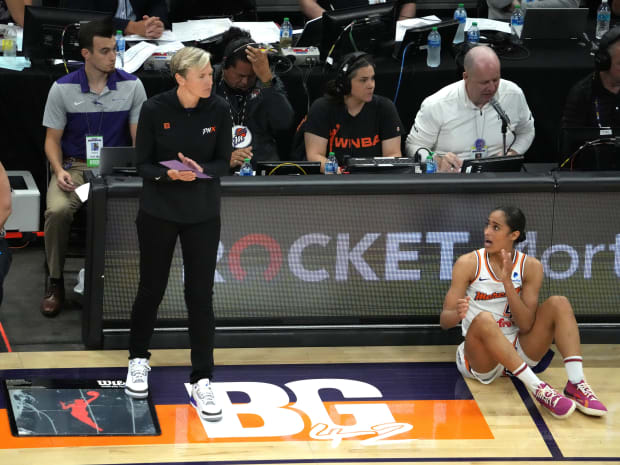This story will be updated throughout Griner’s legal proceedings.
Mercury star center Brittney Griner’s trial began Friday in Russia, where she has been detained for more than four months after being arrested at an airport outside of Moscow on drug charges.
On Monday, a Russian court ordered Griner to remain in custody for the duration of her trial, and her detention was extended to Dec. 20, the Associated Press reported. According to a video posted by the official Russian state news agency TASS, Griner did not speak to reporters following her court appearance. However, photos obtained by the AP showed the WNBA star in handcuffs and looking straight ahead, unlike her mid-May court appearance, in which she kept her head down and covered with a sweatshirt hood.
Griner’s agent, Lindsay Kagawa Colas of Wasserman, tweeted Monday that the hearing was “administrative in nature and not on the merits.” She added, “The fact remains that the U.S. Government has determined that Brittney Griner is wrongfully detained and being used as a political pawn.”
Here is what we know about Griner’s detention:

Rick Scuteri/Associated Press
Why was she detained, and what has happened since?
On Feb. 17, Griner was taken into custody at Sheremetyevo International Airport near Moscow, where Russian officials said they discovered vape cartridges containing hashish oil in her luggage. According to the Russian Federal Customs Service statement, a criminal case involving Griner was “opened into the large-scale transportation of drugs,” which can carry a jail sentence of up to 10 years in Russia.
News of Griner’s arrest was not made public until March 5, however, when the Customs Service said it had detained a U.S. basketball star. It also released a video that appeared to show Griner’s carry-on luggage being searched.
In between Griner’s arrest and news of her detention being made public, Russia invaded Ukraine, beginning an ongoing war that, according to Reuters, has killed at least 47,000 people and seen at least 15 million people be displaced.
In an April op-ed for the Los Angeles Times, Colas wrote Griner was traveling back to Ekaterinburg from the U.S., connecting in Moscow, when she was detained. She had been participating in her seventh season with the prominent women’s basketball team UMMC Ekaterinburg, where players can earn six, or even seven, figures per season. Roughly half of the WNBA’s players were active overseas in 2022 to supplement their salaries from the U.S. league.
A WNBA spokesperson said in early March that all other league players who had been competing for either Ukrainian or Russian clubs during the offseason had left both countries. Many of the WNBA’s biggest stars, including two-time league MVP Breanna Stewart and last year’s MVP, Jonquel Jones, recently played with Griner on Ekaterinburg.
The U.S. has classified Griner as being “wrongfully detained.” What does that mean?
In the weeks following her arrest, Griner’s camp appeared to be concerned that significant publicity around the situation could make it worse. In an email to The New York Times, Colas said that since April 29, the U.S. government has classified Griner’s arrest as a “wrongful detainment,” a designation that allows the United States’s Office of the Special Presidential Envoy for Hostage Affairs more flexibility in efforts to negotiate her release, no matter how the Russian legal proceedings are playing out. The designation change (which was made public on May 3) also signaled a strategy change in how those around Griner raised awareness for the situation.
“Griner’s reclassification as wrongfully detained by the U.S. government cued our shift to the more public activist elements of our strategy,” Colas told The Times.
Then–White House press secretary Jen Psaki said the decision to classify Griner as wrongfully detained was made “in coordination with the hostage negotiator [SPEHA’s Roger Carstens] and the State Department.” ESPN reported that former U.S. ambassador to the United Nations Bill Richardson, who has past experience working as a private international hostage negotiator, has agreed to work on Griner’s case. In a late-May episode of HBO’s Real Sports With Bryant Gumbel, Richardson said he was “optimistic” about Griner’s return to U.S. soil, but that it would require some sort of exchange given her celebrity status.
Days before Griner was publicly labeled by the U.S. government as wrongfully detained, the Biden administration announced the release of Trevor Reed, a former Marine who had been in Russian custody since 2019. Reed, who in July 2020 had been sentenced to nine years in Russian prison for endangering the “life and health” of Russian police officers in an altercation (charges he denies), was part of a prisoner swap. His release has renewed public optimism that Griner could also be part of a swap.

Elaine Thompson/Associated Press
What do we expect from the Griner trial?
Griner’s lawyer, Aleksandr Boikov, said Monday he expected the trial to take up to two months, according to The New York Times. A U.S. official told CNN the U.S. embassy in Moscow would send a diplomat to the hearing Friday. Several officials and experts familiar with Griner’s case told ESPN a trial and forthcoming conviction have always been likely developments, with sources telling ESPN that regardless of whether the Russian prosecutors present compelling or entirely fabricated evidence, the country has indicated it is willing to negotiate Griner’s release.
"The Russians have to keep pretending that this is a legitimate arrest,” Danielle Gilbert, assistant professor of military and strategic studies at the United States Air Force Academy, told ESPN. “There is no reason to believe that the charges are legitimate or that her trial will be fair. But if and when she's convicted, the Russians will have made clear their credible alternative to a deal to bring her home.”
According to NPR, prosecutors opened up the trial alleging that Griner had two cartridges of hash oil for personal use when security inspected her bags. Two customs agents, who were working at the airport when Griner’s bags were inspected, testified for the prosecution, Boikov told NPR. Boikov added that he expects prosecution to have four hearings before the defense gets its turn.
Her next court session is scheduled for July 7, the AP reported.
U.S. Representative Colin Allred, a Democrat from Texas, told The Washington Post that Griner is “for intents and purposes a political prisoner,” adding that those in the public should be prepared for a “sham” trial, resulting in a guilty verdict and sentence. ESPN noted that the trial will not have a jury. According to the AP, less than 1% of defendants in Russian criminal cases are acquitted, and, unlike in the U.S., acquittals can be overturned.
Paul Whelan, a former U.S. Marine, is also being held in a Russian prison after he was convicted in June 2020 and sentenced to 16 years on suspicion of spying. Asked Sunday on CNN whether a joint-swap of Griner and Whelan was being considered, U.S. Secretary of State Antony Blinken said, “As a general proposition ... I have got no higher priority than making sure that Americans who are being illegally detained in one way or another around the world come home.”
Russia’s state-sanctioned news agency TASS media has reported on a potential Griner exchange that would involve Viktor Bout, a Russian national who was sentenced to 25 years by a U.S. judge for conspiracy to kill U.S. citizens, delivery of anti-aircraft missiles and providing aid to a Columbian terrorist organization.
How long could she be in Russia?
Griner has been detained in Russia for more than 130 days, as her detention has been extended repeatedly. In mid-May, a judge denied a request for Griner to be placed in home detention.
Griner’s exact condition in Russia is publicly unknown, but in March, State Department spokesperson Ned Price said U.S officials had met with her and described her in “good condition.” Citing an anonymous source with knowledge of the situation, the Times reported that Griner has seen her Russian legal team multiple times a week while in custody.
However, speaking at a June rally in Houston in support of Griner, Reed, the recently released former Marine, described the conditions of Russian prisons as completely inhospitable, saying he received rotten food and a lack of medical care. He additionally called the country’s legal system “medieval.”
“Every day that you’re in prison there, it's like you’re waking up to a nightmare,” Reed said.
The AP also reported that Griner has been able to receive emails and letters from WNBA players during her detainment. The emails, per the AP, are printed out and delivered sporadically in bunches to Griner by her lawyer after they are vetted by Russian officials. While Griner doesn’t have access to the incoming email account, she either writes a response on paper and her lawyers take a picture of it or she dictates a reply.
Reed, spent 985 days in Russian custody. Whelan has spent more than 1,000 days in Russian custody.
“Our position for some time on this has been very clear: Brittney Griner should not be detained. She should not be detained for a single day longer," Price said in mid-June.

Joe Camporeale-USA TODAY Sports
What are people saying about Griner’s detainment?
In an appearance Wednesday on Reverend Al Sharpton’s radio show, Cherelle Griner, Brittney’s wife, said that she still has not spoken to the WNBA star since she departed for Russia on Feb. 17. Per Insider, Cherelle said that she has received letters from her wife, but that she thinks the letters mask how scared Griner really is.
“Because I am her person, she is always going to write persuasively to make sure I don't break because she knows I have all these things going on. She's always trying to be my strong person,” Cherelle said.
Elizabeth Rood, U.S. charge d’affaires in Moscow, was in court Friday and said she spoke with Griner, who “is doing as well as can be expected in these difficult circumstances.”
Cherelle has said she was planning to speak with Griner on Saturday, June 18, their fourth anniversary, but was unable to because there was no one at the U.S. embassy in Moscow available to connect a phone call between them. She told the AP she initially believed Russian officials had interfered with the call but said she learned from Griner’s lawyers that the U.S. embassy was responsible for the error.
In the aftermath of what the State Department called a “logistical error,” Price said a call between the couple has been rescheduled and will “take place in relatively short order.”
Following Griner’s situation being classified a wrongful detainment, there have been growing calls from the WNBPA for a meeting between Cherelle and President Joe Biden. “He has that power,” Cherelle told ESPN in late May. “You know, I'm just like, ‘Why are we not using it? Like, urgently, use it.’ We're expecting him to use his power to get it done.”
While she has not met with Biden, she said she has spoken with Blinken, the U.S. secretary of state, among other officials. Blinken said Sunday on CNN that the two most recently spoke “just a few days ago,” but that he could not comment “in any detail on what we’re doing, except to say this is an absolute priority.”
Throughout the WNBA season, Griner’s teammates and coaches have continued to raise awareness of her situation. The Mercury met with the state department in Washington, D.C., on June 13, ahead of their game with the Mystics. That meeting was followed by a meeting with U.S. Representatives Greg Stanton, a Democrat from Arizona (a longtime Mercury fan), and Sheila Jackson Lee, a Democrat from Griner’s hometown of Houston.
“It was great to hear from the State Department that we should continue to amplify that message and that we should continue to press all those who have any influence or power to help bring BG home,” Mercury coach Vanessa Nygaard told reporters afterward. “She’s our teammate, she’s an American and we want her back home.”
Players around both the WNBA and NBA have worn T-shirts and sweatshirts raising awareness for Griner’s detainment, with a Change.org petition seeking her “swift and safe return” having amassed more than 280,000 public signatures as of Wednesday night.
The WNBA has also placed a floor decal on the home court of all 12 teams to keep Griner “top of mind” and recently announced Griner as an honorary All-Star starter.
“It is not difficult to imagine that if BG were here with us this season, she would once again be selected and would, no doubt, show off her incredible talents,” commissioner Cathy Engelbert said in the release announcing the honor. “So, it is only fitting that she be named as an honorary starter today and we continue to work on her safe return to the U.S.”
The WNBPA continues to tweet daily about Griner’s status.
Tweeted Colas on Monday: “The negotiation for her immediate release regardless of the legal proceedings should remain a top priority and we expect @POTUS and @VP to do everything in their power, right now, to get a deal done to bring her home.”







